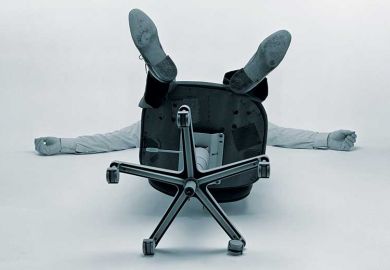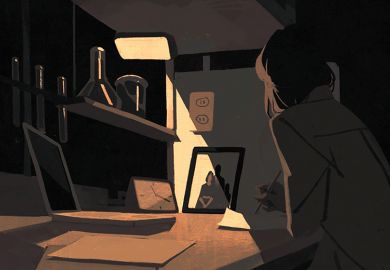On seeing two paths diverge in an autumn wood, Robert Frost was famously “sorry [he] could not travel both/And be one traveller.”
The Road Not Taken reminds us that some choices shape our identity and shadow us with the imagined alternative. Not all choices are binary, but as the leaves turn and I prepare frantically for this term’s teaching, I envy the simple choice faced by Frost. My institution is forcing us to do what he deemed impossible and take both paths at once.
As a lecturer, I am ostensibly contracted to teach, research and administrate. Covid-19 has changed all that. For now, teaching takes precedence. Against the backdrop of a voluntary redundancy scheme, research has been explicitly relegated and all research budgets removed. This deficit will apparently be recovered in the future – although, for many temporary staff, that future does not exist, of course.
Everyone understands that this horrible pandemic demands exceptional efforts. The devoted work to adapt to life in a pandemic, support students and keep going is remarkable. Our collective love for our role as educators is more palpable than it has felt for a long time. Yet our management’s insistence on teaching both in person and online places extraordinary pressure on all of us, and many are starting to break.
The stated rationale is to make all teaching “Covid-resilient”. Behind that, however, is the desire to offer students the best possible experience. Indeed, students are allowed to choose between in-person and online learning. Management have somehow convinced themselves that staff have a “responsibility” to teach in person if the students want it.
This has overwhelming implications. Consider MA teaching. Traditionally, courses are largely based on self-study and focus on a long weekly seminar. Under the new system, we are compelled to offer students a choice between a synchronous in-person seminar and a synchronous online one: a move that doubles our weekly teaching hours. In addition, we have to create online introductory videos for each week and offer extra resources for students who might miss a week, requiring months of extra work.
More perversely, each module is to be carved up between different academics. Before, we would create, teach, assess and take responsibility for courses as individuals. Our teaching was personal, not produced by committee. Now we have to share it, at short notice, with at least one and occasionally two other people – with a third, an “understudy”, lurking in the wings.
Staff are agonising about how to divide up the work. Many are splitting courses in half, undermining their Covid resilience as half the course will be lost if the staff member falls ill. Others have devised Byzantine schedules that are exhausting to implement and vulnerable to disruption.
Adding to the workload are the deadline extensions to last year’s assessments. The 2019-20 academic year continues for staff reading long theses or marking hastily concocted transitional coursework while struggling to prepare for the new term.
We also face new pressures in our pastoral roles. We are told that our presence can “make or break” our students’ “university experience”, so we have to provide weekly group tutorials in addition to our termly check-ins. The workload proliferates.
These changes have been so complicated that our timetabling algorithms imploded. Having just adapted to the blind logic of a centralised system, the task of resolving the mess has fallen back on our shoulders, as the scrabble for breezy rooms is pushed to the limit. Two weeks before term, staff were still unaware of when or where they were supposed to teach. This uncertainty is especially difficult to manage for staff with childcare commitments or who rely on public transport for their intercity commutes.
To add to the pressure, the university’s Covid flexible-working policy has been revoked, despite the growing threat of another full lockdown. Months into the pandemic, we have had no financial support to assist in the swerve from tech-filled lecture rooms to the kitchen table. Nor did we get the promised honesty about existing cases of the virus on campus. Instead, we were sent pictures of warning signs and disinfectant, and we are promised a branded face-covering.
Staff here are adamant that teaching physically in the winter term cannot be justified. Covid resilience is being pursued at the expense of our resilience. We are being asked to teach double or triple what we were expecting, to cover unfamiliar material at short notice, using new methods, in collaboration with other people, all at personal risk to ourselves and our families. We are denied the choices and flexibility we are compelled to provide for our students, despite being more vulnerable to the virus.
The attempt to tread both teaching paths risks tearing staff apart; they – and our vibrant university community, too – will struggle indeed to “remain one traveller”. Some will undoubtedly become sick with Covid; many more will burn out with stress-related illnesses and frayed mental health.
As they contemplate this fork in the road, universities must choose the path of sanity.
The author is a lecturer at a UK university.
Register to continue
Why register?
- Registration is free and only takes a moment
- Once registered, you can read 3 articles a month
- Sign up for our newsletter
Subscribe
Or subscribe for unlimited access to:
- Unlimited access to news, views, insights & reviews
- Digital editions
- Digital access to THE’s university and college rankings analysis
Already registered or a current subscriber?







